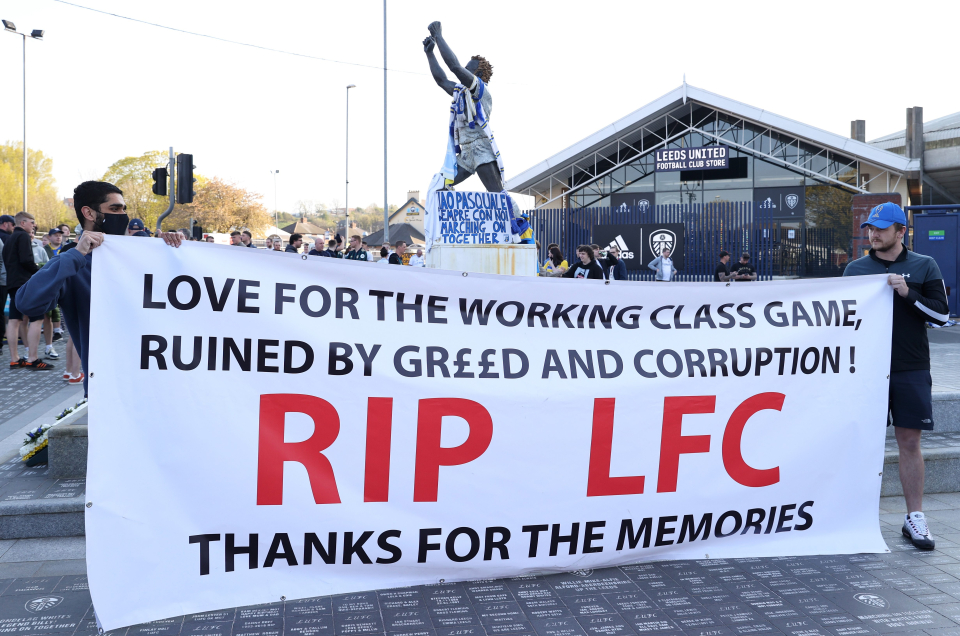The clubs were beginning to exert more power and the long-standing status quo was under threat. Money was becoming equally, if not more, important than deciding who was the ‘best’ of the ‘best’.

Fan Power Now In A League Of Its Own

Darren Young
@fanexperienceco
Darren has been a part of The Fan Experience Company since 2017.
He has a background in working on customer service excellence projects in the UK and Europe, and an MBA that included studying in the USA .
He is responsible for the reports that in 2019/20, went to over 200 clubs in 13 countries.
Well, that went well.
Even before the latest shenanigans, there was very little point in a fan-focussed company like us condemning the Seven Four Three Cities Super League breakaway attempt and saying it’s a bad thing for football fans all over the country, continent and maybe the whole world.
When the fan groups of the clubs breaking away are doing it already, we don’t really need to. From Chelsea’s banners to Liverpool’s coffins, it was pretty clear that the club’s owners had massively underestimated the public reaction to this and most of all, that of their own most important stakeholders.
It was smeared from the start. Anything that is leaked out on a Sunday afternoon and then officially announced late that same night feels underhand; as if they preferred to keep us all in the dark. But in a social media world, nothing remains hidden for long and the widespread rising of fans – of all clubs – was more powerful than anything we’ve seen before. It was real ‘today I saw a gladiator become more powerful than the Emperor of Rome’ stuff.
But before we get too excited, remember how – not long ago in another European-related fiasco – we ended up wanting a Brexit deal simply because it was better than no-deal? Even though most of us didn’t want either of them. This might be the football equivalent, with us now asked to swallow UEFA’s Swiss-model as the better option. It was unanimously voted through by UEFA on Monday, as senior officials simultaneously sent shots across the bow to the rebel clubs.
But the Swiss-model is very similar. A bit like comparing the shirts of West Ham and Aston Villa; mostly the same with a few little details and words that are different.
As the six English clubs have pulled out, followed by Inter, Atletico and Milan, the project looks all but dead in the water. Until next time.
Because despite the seismic shockwaves on Sunday, none of this is anything new. The Swiss-model and Project Big Picture are also power grabs by the already wealthy and it’s been going on for three decades, only at a far slower pace until now; when the economic impact of Covid seems to have accelerated the need for speed to try and fill the financial black hole in the club’s bank balances.
Whenever such a move is made, a European Super League is the weapon of choice and it’s always been so. The early – and more successful attempts – used the existing European Cup as it’s change vehicle and turned it into the Champions League.
The original format of the competition was a beauty, a knockout competition over two legs (with away goals added in 1965 starting with the European Cup Winners Cup) and a one-off final, that remained in place from the original incarnation in 1955 right through until 1991. But having the thirty-odd (as it was) European champions playing in a cup to find the best one wasn’t enough for some.
In 1991-92, they began to tinker with the format for the first – but certainly not the only – time. The direct reason was money, naturally – as the new format was designed to create more guaranteed games – and indirectly protection for the bigger teams so they could stay in the competition until the latter stages.
Originally, there was no such protection. A seeding system was only introduced belatedly after Juventus and Real Madrid were drawn to face each other in the second round in 1986-87, which caused an outcry because one of the heavyweights would be out early on (and we couldn’t have that could we?).
Not only was there an absence of seeding but also no need to keep teams from the same country apart. The only time two teams from the same country could meet was if it was the holder of the cup, versus the winner of the league. So, in 1978-79, Nottingham Forest beat Liverpool in the first-round on the way to their first of two successive European Cup wins, and before that, in 1960-61, Barcelona had knocked out five-time winners Real, also in the first round. But that occurrence was becoming a thing of the past by the late-eighties.
The next change (in 1997-98) meant that it wasn’t the best of the best any longer. The move to allowing runners-up into the new group format, then third place and eventually, in some cases, the top four clubs, pushed it closer to a European League than ever before. They also toyed with various group stages (including two in the same season for a while) before the current format stuck. But the underlying aim was to get more of the big clubs in and keep them in. And while the closed shop ESL might now be pulling the shutters up, the new UEFA model still gives places to teams who don’t finish high enough to qualify on merit.
It also excludes many of the rest. Some countries path to the Champions League group stage has become so long and arduous, not to mention practically impossible, that even a club with the resources – and attendances of 60,000 – like Celtic rarely get that far these days.
The fall-out from this week has barely begun. Amongst the apologies or defiance, depending on which city you are in, is the breakdown of any remaining trust. The voice of the fans has become stronger in London, Liverpool and Manchester this week and all clubs are waking up to this, because it’s all fans who feel betrayed. The Premier League and EFL would have seen their broadcast value drop completely and while this is a time when football needs a financial reset; I don’t think all of the wealth going to the top few was what people had in mind.
As a fan-focussed company, we of course welcome the fact that the owners have seen the fan power for themselves and been forced to react. And it was good to see players and managers recognise this too. As Patrick Bamford said, after helping Leeds United to the kind of result that makes megalomaniacs want a closed shop in the first place, ‘without fans football is nothing, it’s so important to stand our ground and keep it this way.’
Without any legs, and Juve’s Andrea Angelli seemingly writing it off, it remains to be seen how Real and Barcelona (one of their values: humility) progress with the ESL but given they both owe more money than Rushi Sunak, they need to tread carefully as they have fans to answer to as well, and the pressure will grow on them to put their hands up and admit they too made a mistake.
My own personal frustration with all of this is that the ‘Big 6’ in England assume that they are in a position to ride roughshod over everyone else to begin with. I mean, what even makes a ‘top six club’ a top six club? Not league position, clearly. Not trophies either, as Sunderland and Huddersfield (to name two) have won more league titles than Spurs. Surely it’s not just being in the right place at the right time?
If this ESL was dreamt up in, say, 1978, 1984 or any other given year, then some of the ‘Big 6’ would be nowhere near it. Liverpool, yes, but they also went 20 years without a league title while Chelsea and Manchester City have spent a lot of time in the second tier before they were purchased by mega-rich owners. Manchester United went years without major honours before Fergie came along. If Spurs win the League Cup on Sunday, it will be their first trophy since winning the League Cup in 2008, and Arsenal are only just about in the top half of the Premier League this season. Maybe they all need a bit of that humility right now.
The rebuilding of trust at the higher echelons of English football starts immediately. Who knows if they’ll ever get there?
We do know that fans have spoken.
And their word means more than it ever has before.
Want to read more by The Fan Experience Company?
See our White Paper about the balance between safety and the match day experience?
The paper ‘It’s Just Like Watching Pret’ can be viewed by clicking here

© The Fan Experience Company 2020
